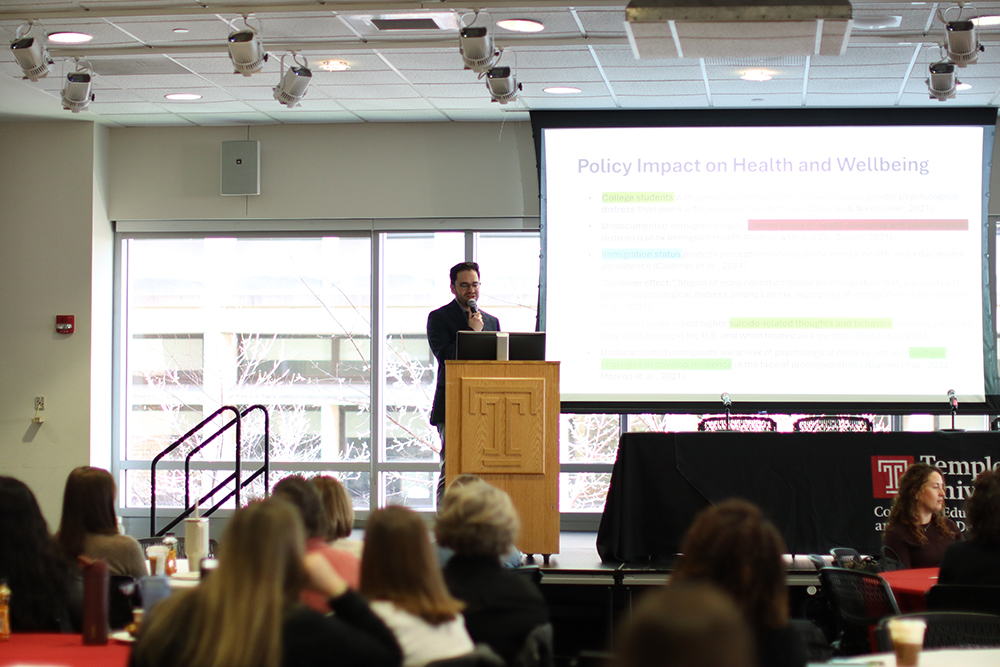On Friday, March 21, 2025, Temple University’s College of Education and Human Development (CEHD) hosted the 44th Annual School Psychology, Counseling Psychology and Applied Behavior Analysis Conference. Sponsored by the Association of School Psychologists of Pennsylvania, the School District of Philadelphia and CORA Services, the conference brought together practitioners, faculty and students to exchange insights and advancements in the fields of school psychology, counseling psychology, applied behavior analysis and beyond.
The conference commenced with a keynote address by Germán A. Cadenas, associate professor of clinical psychology at Rutgers University and associate director of the Center for Youth Social Emotional Wellness (CYSEW). Cadenas specializes in the psychology of immigration and critical consciousness as a tool for social justice. His presentation, "Holding Sanctuary for Immigrant Youth and Families in Educational Spaces," examined the impact of anti-immigrant policies on the well-being and development of immigrant youth, emphasizing the importance of fostering educational environments that affirm the health and well-being of these individuals. Attendees resonated with the concept of a sanctuary mindset. A school psychology intern Aenya Ulke reflected, "I think [the panel] was very relevant. It is important to, as the speaker said, have the sanctuary mindset, where you know we are taking care of these kids. We need to provide them with the services that they deserve."
This focus on advocacy and structural change was echoed by associate professor and conference organizer Heidi Hutman “Helping professionals play a key role in promoting the self-determination and well-being of students, individuals, families, and communities,” she said. “In the current climate, the need for us to advocate for and with at-risk populations, including immigrants, persons with disabilities, and other marginalized groups, is more important than ever before. By equipping trainees with the structural competencies needed to implement individual and systemic-level interventions, we can ensure that they are optimally positioned to become effective change agents within their respective clinical settings.”
Beyond the keynote, the conference offered a wide range of sessions and interactive discussions on trauma-informed practices, sociocultural awareness and advocacy strategies. These sessions empowered attendees with tools to address challenges in educational and mental health contexts. Jay Tarnoff, an attendee, noted, “There were lots of informational resources offered that [attendees] can now share with people that need it.”
The event also encouraged rich interdisciplinary collaboration and networking. CEHD graduate Sitara Vaidy said she appreciates being part of a community committed to advocacy and growth. “It’s reassuring to be in a room full of people who are advocating for their students.” Another CEHD graduate student Colette Hyde emphasized the importance of applying insights from the conference in their practicum settings.
Reflecting on the significance of the event, assistant professor Crystal Austin stated, “It is essential to incorporate awareness of sociocultural context and offer space… to share about their identity experiences in ways meaningful for them.” She added that interdisciplinary collaboration helps create “a rich and holistic experience for providers and stakeholders alike.”
Associate Professor Jessica Reinhardt, who also played a key role in organizing the conference, shared her ongoing enthusiasm. “Having helped organize this conference for the past few years, I continue to see the importance of offering diverse topics that reflect the wide range of perspectives within our fields. I’m proud that CEHD can host an event that brings together such a dynamic and engaged professional community.” She added that “the connections, energy, and shared commitment to growth are what make this conference so special. I’m already looking forward to what 2026 will bring!”
The 44th Annual School Psychology, Counseling Psychology and Applied Behavior Analysis Conference reinforced the vital importance of advocacy, inclusion and systemic change. With enthusiastic energy and practical strategies, attendees left inspired to foster supportive, equitable environments within their communities, carrying forward Temple University’s mission to prepare professionals who lead with purpose and compassion.

